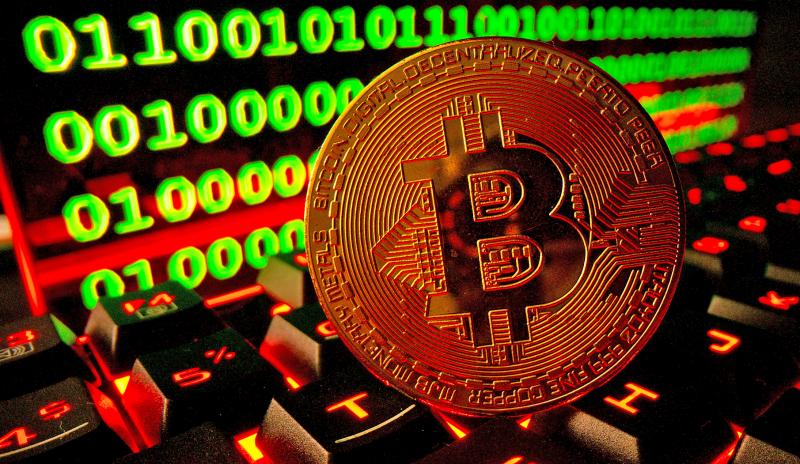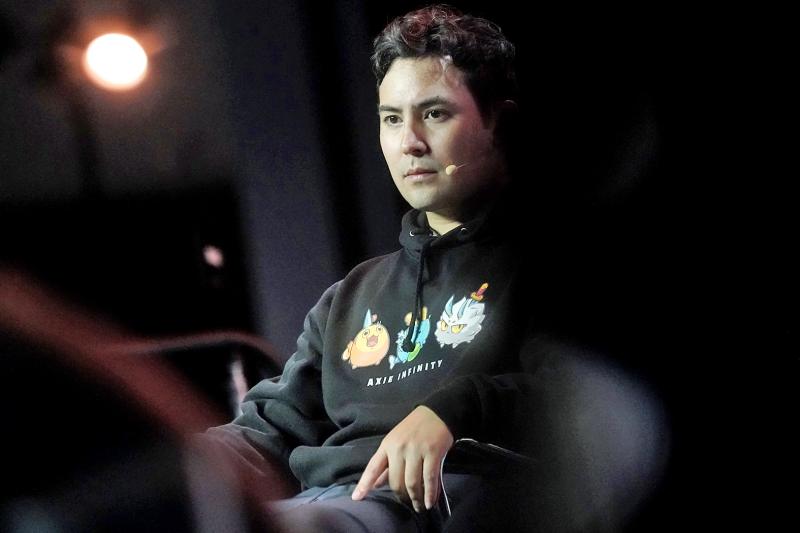Investigators are on the trail of hackers who spirited away more than US$600 million in cryptocurrency last week, watching the money as it moves around a system that critics call the Wild West of finance.
But they are playing catch-up: the gaming company that got scammed apparently did not even notice for six days.
The hack is one of the biggest to hit the crypto world, raising huge questions about security in an industry that only recently burst into the mainstream thanks to celebrity promotions and promises of untold wealth.

Photo: REUTERS
The sector has been beset by scams and hacks.
This week’s theft from the makers of Axie Infinity, a game where players can earn crypto through game play or trading their avatars, came just weeks after thieves made off with around US$320 million in a similar attack.
“We are seeing more hacks because there is more money in blockchain,” said Roman Bieda of Coinfirm, a crypto security company, referring to the technology that underpins cryptocurrencies.

Photo: Bloomberg
The industry should have learned the lessons from previous attacks but security was still being sacrificed for profit, he added, labelling Axie’s failure to notice the hack a “huge deficiency.”
REFUNDS PROMISED
The Axie Infinity attackers exploited weaknesses in the set-up put in place by the Vietnam-based firm behind the game, Sky Mavis.
The company had to solve a problem: the ethereum blockchain, where transactions in the ether cryptocurrency are logged, is relatively slow and expensive to use.
To allow Axie Infinity players to buy and sell at speed, the firm created an in-game currency and a sidechain with a bridge to the main ethereum blockchain.
The result was faster and cheaper — but ultimately less secure.
Hackers were able to take over the sidechain and empty its coffers apparently without anyone realizing, something experts say would be all but impossible on the ethereum blockchain.
The firm said it would recover or reimburse the funds, easing the anxiety of gamers — particularly in the Philippines where hundreds of thousands play Axie Infinity.
“Some of the Philippine community right now are going crazy because of what happened,” said Dominic Lumabi, a gamer from Manila.
Some feared the game would close and money would be lost, he said, adding that he was relieved Sky Mavis was being transparent.
But the firm faces a tough challenge to get the money back.
‘CONSTANT BATTLE’
Security firms are monitoring the stolen money as it moves through various wallets, as accounts are called in the crypto-world.
Blockchain data platform Chainalysis is helping Sky Mavis track the money, and Elliptic said it was investigating and alerting its clients.
Bieda from Coinfirm said that sooner or later the perpetrators would be traced.
“The bigger the amount, the harder it is to hide,” he said.
But even though investigators can see where the money is, there are tricks the thieves can use.
They can employ software that mixes the stolen money with legitimate streams, use exchanges with lax rules, or move their funds to a jurisdiction with no rules at all such as North Korea or Russia.
Any of those moves makes it much easier to transfer the cryptocurrency into everyday, spendable cash.
It is a “constant battle” between the thieves and those trying to stop them, said Bieda.
“Adoption (of cryptocurrency) is growing, more protocols and more solutions are created, but the pursuit of cheap transactions and profit means the industry sometimes... forgets about security.”

Towering high above Taiwan’s capital city at 508 meters, Taipei 101 dominates the skyline. The earthquake-proof skyscraper of steel and glass has captured the imagination of professional rock climber Alex Honnold for more than a decade. Tomorrow morning, he will climb it in his signature free solo style — without ropes or protective equipment. And Netflix will broadcast it — live. The event’s announcement has drawn both excitement and trepidation, as well as some concerns over the ethical implications of attempting such a high-risk endeavor on live broadcast. Many have questioned Honnold’s desire to continues his free-solo climbs now that he’s a

As Taiwan’s second most populous city, Taichung looms large in the electoral map. Taiwanese political commentators describe it — along with neighboring Changhua County — as Taiwan’s “swing states” (搖擺州), which is a curious direct borrowing from American election terminology. In the early post-Martial Law era, Taichung was referred to as a “desert of democracy” because while the Democratic Progressive Party (DPP) was winning elections in the north and south, Taichung remained staunchly loyal to the Chinese Nationalist Party (KMT). That changed over time, but in both Changhua and Taichung, the DPP still suffers from a “one-term curse,” with the

Lines between cop and criminal get murky in Joe Carnahan’s The Rip, a crime thriller set across one foggy Miami night, starring Matt Damon and Ben Affleck. Damon and Affleck, of course, are so closely associated with Boston — most recently they produced the 2024 heist movie The Instigators there — that a detour to South Florida puts them, a little awkwardly, in an entirely different movie landscape. This is Miami Vice territory or Elmore Leonard Land, not Southie or The Town. In The Rip, they play Miami narcotics officers who come upon a cartel stash house that Lt. Dane Dumars (Damon)

Today Taiwanese accept as legitimate government control of many aspects of land use. That legitimacy hides in plain sight the way the system of authoritarian land grabs that favored big firms in the developmentalist era has given way to a government land grab system that favors big developers in the modern democratic era. Articles 142 and 143 of the Republic of China (ROC) Constitution form the basis of that control. They incorporate the thinking of Sun Yat-sen (孫逸仙) in considering the problems of land in China. Article 143 states: “All land within the territory of the Republic of China shall